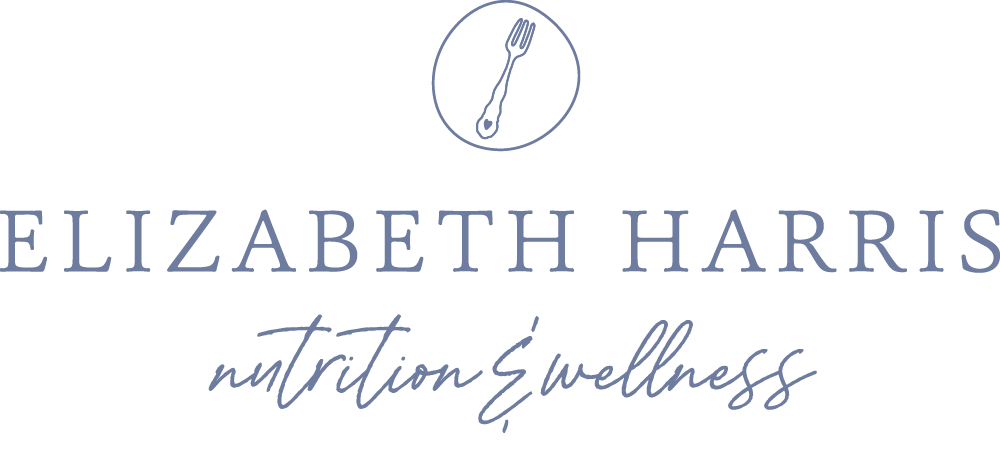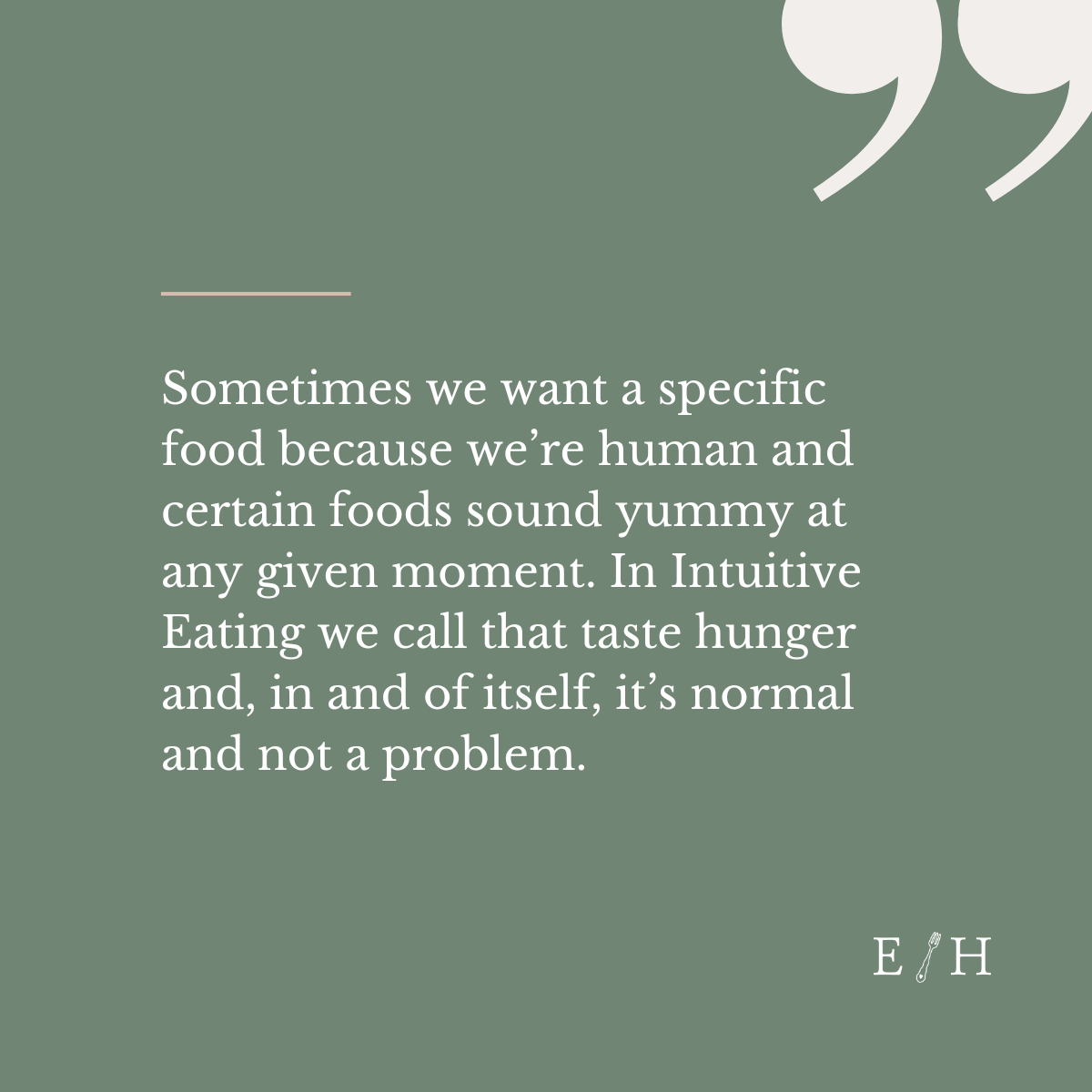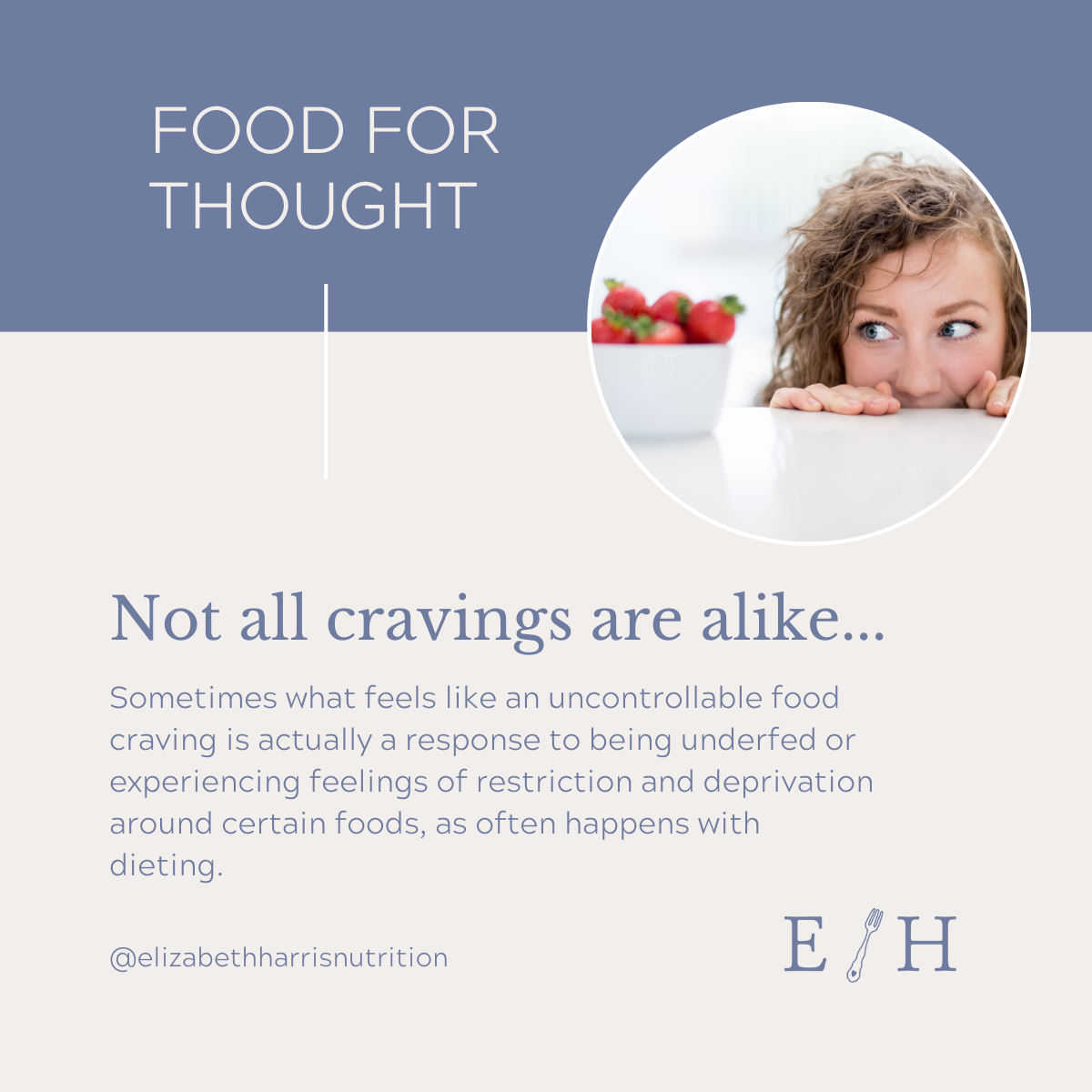Food Cravings: Why We Have Them and How to Manage Them
Do you ever feel like you’re locked in a battle, struggling to resist food cravings that feel insurmountable?
If so, you’re not alone. As a dietitian, people tell me all the time that they want help kicking their food cravings to the curb. And let’s face it, they’re not usually talking about cravings for salmon or veggies, but rather for things like sweets, chips, and other less nutrient-dense foods.
They’ve heard the conventional tips —distract yourself, drink water, don’t go to the supermarket hungry, eat an apple instead — but they’ve not typically found that guidance to be very helpful, especially over the long term. Not only can uncontrollable food cravings set you up for the type of eating that’s less than optimal for your health, but they can damage your sense of self-trust as well.
Let’s explore some common reasons behind food cravings and some proven, doable strategies that may help you navigate them more successfully while also promoting a healthy relationship with food.
First, what is a food craving really and when are they problematic?
When we talk about a food craving, we’re talking about an overwhelming, persistent desire to eat a specific food that may or may not be related by physical hunger.
Physical hunger typically builds gradually, is experienced when we haven’t eaten enough or in a while, and we usually experience both physical and mental signals (such as a hollow or growling stomach, low energy, reduced mental focus, or when overly hungry, feeling week, faint, or dizzy).
Food cravings, on the other hand, may feel more emotional, are experienced more in your mind, and aren’t necessarily linked with how much or when you last ate. Unlike physical hunger, which is curbed after eating, cravings may only be satiated with very specific foods.
Sometimes we want a specific food because we’re human and certain foods sound yummy at any given moment. In Intuitive Eating we call that taste hunger and, in and of itself, it’s normal and not a problem.
Where food cravings may become problematic, though, is if they make you feel out of control with food, lead to uncomfortable overeating or bingeing, are related to unhelpful emotional eating, result in over-nourishment, or they disrupt your sense of self-trust or self-esteem.
Stress, emotions, nutrient deficiencies, and ingrained eating habits can all contribute to or impact food cravings.
Physiological reasons behind food cravings
Food cravings can be triggered for both psychological and physiological reasons, and it’s important to understand the root cause of your cravings so you can know how to address them most effectively.
The first thing I look at when someone comes to me struggling with cravings is, are you getting enough to eat consistently throughout the day? Many people who are used to dieting or otherwise restrictive eating patterns are simply not allowing themselves enough calories each day. As a result, they get overly hungry and can become preoccupied with food (which is one way your body tries to keep you alive by inducing you to eat!). What feels like a food craving is instead urgent, biological hunger and eating more or more consistently throughout the day goes a long way towards minimizing cravings.
My Intuitive Eating coaching clients are frequently shocked to discover that their extreme food cravings are dramatically reduced once they’re more tuned into honoring their hunger!
Stress and sleep deprivation both result in hormonal shifts that may also contribute to food cravings. Chronic stress, for example, can lead to persistently elevated cortisol levels, which in turn increases appetite. Some studies have shown that chronic stress impacts food preferences in favor of highly palatable foods or ones that are higher in calories, simple sugars, and/or saturated fats. Lack of sleep has been shown to have a similar effect on food preferences. Plus when we don’t enough sleep, our bodies also release more ghrelin, a hunger hormone that’s been linked with increased food cravings, and less leptin, a satiety hormone. So, you’re more likely to be hungry, fill up less easily, and experience food cravings without sufficient sleep.
Other hormonal fluctuations such as women’s monthly menstrual cycles can impact food cravings too.
Psychological underpinnings of food cravings
Just as dieters may be physically under-nourished, they often experience the psychological impact of food restriction and deprivation too. Research has found that the more we try to restrict and avoid certain foods (as with dieting), the more likely we are to crave and overeat those very same foods. Deprivation is a powerful force!
Even the threat of food deprivation has been shown to increase food cravings and bingeing behaviors. If you’ve ever planned to start a diet come Monday or next month and found yourself loading up on all the foods you soon plan to cut out, you’ve experienced this phenomenon firsthand.
Diet culture is super sneaky and there are many hidden forms of dieting that can keep you stuck in the same frustrating patterns with food — even if you’re actively trying to break free from dieting. Download my free resource, Invisible Diet: Hidden Rules You’re Still Following That Sabotage Your Success, to learn what they are and what you can to get unstuck.
One of the 10 principles of Intuitive Eating involves giving yourself unconditional permission to eat and enjoy foods that may have previously been off limits with dieting. The goal is to become habituated to those foods (which is a fancy way of saying your brain won’t find them overly novel or exciting because there’s no longer a threat of deprivation around them). There’s loads of misunderstanding and misinformation around this concept of Intuitive Eating, but you can learn more about it in this Wellness Rebranded podcast episode.
For now, know that I’ve helped hundreds of women make peace with food and kick uncontrollable food cravings to the curb and helping them get out of the restrictive mindset around food has been a critical, can’t-miss step.
Stress and emotional eating habits can also contribute to or exacerbate food cravings. I share lots of tips on how I help my clients heal emotional eating here and we’ll talk more about stress below.
A quick note on food addiction and cravings
I know there’s lots of information out there promoting the idea that certain highly palatable foods are addictive and therefore can trigger extreme cravings. This is a controversial topic with no true consensus around it.
Proponents of the idea claim that certain foods light up the same reward and pleasure centers in the brain as drugs and alcohol. However, so do music, cuddling your dog, and other activities that are not considered addictive.
Further, most of the research on addiction has been done in rodents, which doesn’t necessarily translate to people in the same way. And perhaps most significantly, most of the studies on this topic have not controlled for the effects of physical and psychological restriction, which as we talked about above have a well-documented and powerful effect on eating behaviors. In other words, it’s impossible to tell from those studies whether the behaviors are a result of a true addiction or a response to restriction and deprivation. For now, the jury is out.
There’s lots of ongoing research being done around ultra-processed foods, the brain, and eating behaviors and it’s an area I’m watching closely.
Tips for Managing Your Food Cravings While Promoting a Healthy, Happy Relationship with Food
First, Make Sure You’re Meeting Your Basic Self-Care Needs
I know it sounds rather unsexy, but it really is important to start with the basics by making sure you’re getting enough to eat, eating balanced meals, moving your body regularly in ways you enjoy, and getting adequate sleep. I promise, these things might seem simple, but they can go a long way towards helpfully addressing food cravings. And simple or not, they may require some effort to incorporate into your routine if you’re not already doing them!
In terms of your eating, aim to balance your meals with lean proteins, complex carbs, healthy fats, and plenty of colorful, fiber-rich foods. This episode of my Wellness Rebranded podcast, Gentle Nutrition — Nutrition Without the Diet Culture — offers lots of great tips for how to do this simply and enjoyably. By helping you feel energized and satiated, balanced meals can help minimize extreme cravings.
If you’d like help breaking up with dieting once and for all or locking in flexible, enjoyable, and sustainable nutrition practices, I invite you to schedule a free whole health strategy call with me here to chat about the different ways I can support you with this.
Simple ways to practice lowering or managing your stress
Not only can stress impact your eating behaviors and influence cravings in the ways described above, but your bandwidth for making supportive food and self-care choices is much lower when you’re chronically stressed.
If you can reduce your stress by getting things off your plate, saying no to things you don’t have the bandwidth for, or delegating or getting support with some of the items on your plate, by all means do that. But let’s face it, sometimes we simply cannot avoid the stressors in our lives.
Instead, what we can do is make sure we’re utilizing effective stress management practices that can help you complete the stress cycle in your body. And don’t worry, these activities don’t have to be overly complicated or time consuming.
Some evidence-based ways to complete the stress cycle and help your body return to its baseline or homeostatic happy place include:
Physical activity (this doesn’t necessarily mean a long slog on the treadmill if that’s not your thing; it can be a 10- or 15-minute dance party or a quick walk around the block)
A few rounds of deep belly breathing
Meditation – even a 5-minute guided meditation can be helpful
Getting outside in nature for some fresh air
Doing something creative like drawing, painting, making music, cooking, flower arranging, or whatever creative pursuits bring you joy
Laughter — put on the that movie clip that always makes you laugh out loud
There’s a fabulous book called Burnout: The Secret to Unlocking the Stress Cycle that I highly recommend if you want to learn more about stress and the stress cycle.
Getting in touch with your emotions
If your food cravings are linked with unmet emotional needs, understanding and offering yourself space to process your emotions is important.
Here are a few ways to cope with your emotions with kindness (another one of the 10 principles of Intuitive Eating):
Journaling
Talking to a friend or support person
Practice naming and identifying your emotions and then asking yourself, “what do I need” to support myself through whatever it is I’m feeling right now?
Creative expression such as music or art
Getting support from a therapist
Set supportive and caring expectations for yourself
If you struggle with food cravings, I encourage you above all to be gentle with yourself. Remember that some degree of cravings is normal, and the solutions and practices we’ve talked about are not quick fixes. Most likely, it will take time for you to understand your patterns and triggers, and once you do have better awareness around what’s really behind your food cravings, you’ll have to practice compassionate curiosity and patience as you experiment with many of the tools we talked about and build new habits.
Changing ingrained eating patterns can be difficult and it’s rarely a straight path from problem to lasting solution. Expect ups and downs on your journey.
Remember to measure your progress from your starting point not your end goal; it’s far more motivating, plus it will help you avoid getting too attached to a timeline for healing. Be sure also to acknowledge all the small wins along the way—a rule in my coaching programs is that no win is too small to celebrate!
Please know that you don’t have to struggle with food cravings on your own. Professional support is available. As an Intuitive Eating dietitian, I can help you understand the why behind your eating and cravings. I’ll support you to heal your relationship with food and body as you shift your eating patterns and prioritize your nutrition and whole health.


